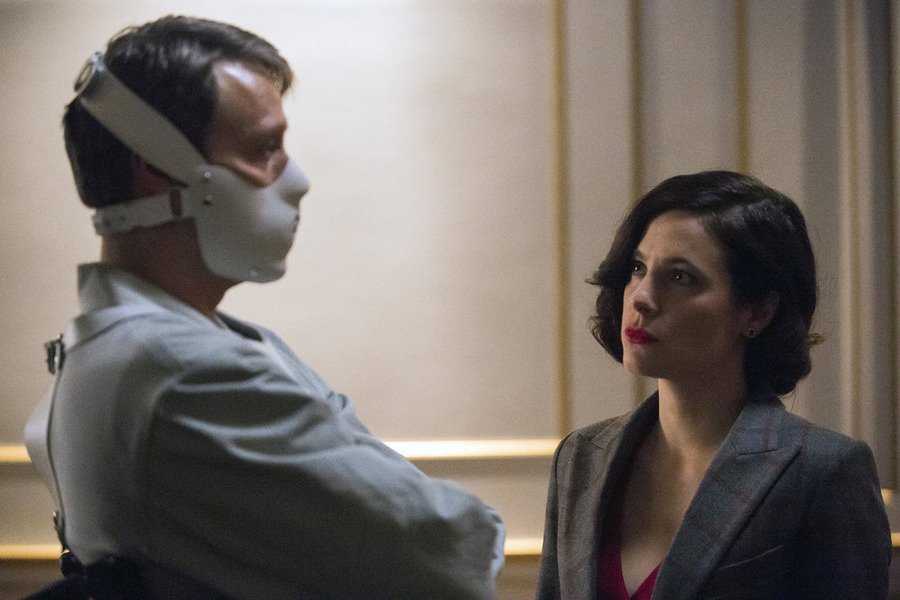'Hannibal' Finale Review: “The Wrath of the Lamb”
Robert Tiemstra ‘16/ Emertainment Monthly Staff Writer
“You and I are suspended over the rolling Atlantic.”

This isn’t to say that the ending we got is completely different from the two perfect endings seasons one and two had, but it is the logical step up from the two, providing the uncomfortable irresolution of season 1, and the ambiguous crescendo of season 2. The last shot of this series is going to stay with viewers for a long time because it both prompts questions and churns the stomach. This is what makes great horror work — not jump scares or creepy little children, but a deeply unsettling atmosphere that holds on to you long after the credits roll.
The episode begins in the house of Francis Dolarhyde (Richard Armitage, moving like a wounded bear) where he tries to resist his urges and burn Reba McClane (Rutina Wesley) alive instead of letting the Dragon “change” her. In Red Dragon, Dolarhyde’s character arc feels slightly incomplete, resolved simply when he loses the battle of wills with his ferocious alter ego. It makes sense within the pages of the novel, but what it amounts to is a dynamic character transforming into a one dimensional antagonist for the sake of a simpler climax. Armitage’s Dolarhyde never gives over completely to the Dragon, but does give up his humanity. This makes the beast they face in the end a much more unpredictable one than the creature that set the unfortunate Dr. Chilton (Raúl Esparza) on fire.

One remembers the final scene in The Silence of the Lambs, with Clarice Starling (Jodie Foster) left hanging on the phone, desperately calling after Dr. Lecter. “The Wrath of the Lamb” leaves us with the very same feeling, wanting to get in touch with this fiendishly charming man again, but not getting the satisfaction of being called back. Another literary example that comes to mind is Sir Arthur Conan Doyle’s The Final Problem, in which he temporarily kills off Sherlock Holmes by having him and Professor Moriarty fall to their (presumed) doom in the Reichenbach Falls. True to the series’ Lynchian influences, in the end, it does not matter whether Hannibal and Will survive their fall off the cliff — it is more about the feeling of being left behind by a great, and in this case terrifying, presence. It is an expertly done ending because it is ambiguous, but not dissatisfying. Each character is allowed to fulfill their character arcs completely before we are left with a single question to answer (or not answer) for ourselves: what will become of Hannibal Lecter?
According to Bryan Fuller, the De Laurentiis company is pursuing the option of having Hannibal revived as a feature film. But for the time being, this is what we’re left with: an empty cliff and crashing waves, a woman waiting for a dinner guest who may never show up, and a dead Dragon atop a cliff. Hannibal was always a show that kept one foot in reality and the other firmly in the world of the surreal. Through the deliciously crafted cinematography and color correction, we see this world as a gorgeous one full of sublime details that are almost completely oblivious to their grisly context. Even now, there are a dozen articles online suggesting shows that can “fill the void that Hannibal left”, but they’re all a little misguided. Hannibal was like nothing ever seen on television before and will probably remain one of a kind for years to come.

That’s it, Hannibal fans. Thirty-nine hours of gore, surrealism and psychology later, this series, which at the outset seemed like it would be another soulless attempt to cash in on a recognizable villain, wound up being the best thing to happen to the Manhunter franchise since The Silence of the Lambs. Kudos to Bryan Fuller and his team of writers, directors, and craftsmen, who made cable-level drama work on a broadcast network. Will the Emmys notice? Probably not. But like its titular character, Hannibal is unconcerned with press or acclaim. It is simply satisfied by leaving an impact on our psyche, deserting the audience like Bedelia at that ominous dining room table. Adieu, Dr. Lecter, and hopefully Hollywood’s reboot obsession won’t be coming for you before the taste of this series has faded from our palettes. That would be quite rude.
Episode Grade: A
Series Grade: A
“When life becomes maddeningly polite, think of me.”